Magazine History
MAGAZINE HISTORY
The founding of The Critical Magazine of Real Estate Law in January 1925 was born as a personal project of a great scholar in the field of Mortgage Law , Mr Jerónimo González, shared with several jurists, mainly registrars and officials of the Facultative Body of the General Directorate of Registries and Notaries. Initially, it adopted the legal form of a limited liability company, constituted by the president of the Association of Registrars, Vicente Cantos Figuerola, Registrar of Madrid, and by Mr Jerónimo González. This legal form subsists until the National Association of Property and Mercantile Registrars of Spain directly assumes ownership of the magazine, acquiring the shares of the company, as stated in the number corresponding to January-February 1965. Since this second, more collegial, period, it is customary practice for the Deans of the Public Corporation to become permanent members of the Editorial Board. This happened with the then Dean Pedro Cabello de la Sota, and with his successors, Juan-José Benayas, José Poveda Murcia, Pío Cabanillas Gallas, Antonio de Leyva y Andía, Carlos Hernández Crespo, José Poveda Díaz, Antonio Pau Pedrón, Fernando Méndez González, Eugenio Rodríguez Cepeda, Alfonso Candau Pérez and Gonzalo Aguilera Anegón.
Distinguished jurists have chaired the Editorial Board of the Critical Review and held the position of Counselor-Secretary. Suffice it to point out that it has been presided by, no less, Mr Jerónimo González himself, Ramón María Roca Sastre, Luis Díez-Picazo y Ponce de León, Aurelio Menéndez Menéndez, and currently, Francisco Javier Gómez Gálligo. Luis Díez-Picazo y Ponce de León also held the position of Director-Secretary, being subsequently succeeded by Francisco Sánchez de Frutos, Fernando Muñoz Cariñanos, Francisco Corral Dueñas, Francisco Javier Gómez Gálligo, and currently by Basilio Aguirre Fernández.
Ms Rosa Carretero Pindado, daughter of Tirso Carretero García – also a famous mortgage law scholar- has been carrying out the administrative tasks of the Magazine since 1984, and has played an essential role in its functioning. Previously, auxiliary tasks were carried out, in a less institutionalized manner, by Fernando Sequeira, an official of the General Directorate of Registries and Notaries.
At present, the Critical Review of Real Estate Law is more lively and active than ever. It has a community brand, is in very good health in terms of subscribers and is fully digitized. In a recent survey among Law Faculties, it has obtained one of the highest marks among the most prestigious legal journals.
Some recent reforms have been undertaken by its Executive Committee, including adapting to formal requirements imposed by the Ministry of Education, such as providing a summary of each of the works translated into English. Now this web page is created.
But the important thing is that it remains faithful to its rationale, which is the critical analysis of the legal system in general, with a special focus in real estate and registration law.
FOUNDATION PROGRAM
The founding program of the Critical Review of Real Estate Law appeared in its first issue, published on January 31, 1925, in the following terms: “The radical transformation that the Spanish real estate system underwent with the 1861 Mortgage law, which motivated the creation of the Corps of Property Registrars, has not produced all the beneficial results that could be expected from it, nor has it penetrated the rural population, said, above all, to reap the benefits of the new system.
The fault has been of the legislative measures in question, deficient and inadequate for the mortgage development; of the jurisprudence, that clings more and more to the old molds; of the Executive Power, more concerned with political action than with legal progress, and with the abandonment of real estate studies in Academies and Universities.
Against such adverse trends, the Corps of Property Registrars, as a legitimate son and representative of the inspiring spirit of the Mortgage law, has tried on different occasions to organise its forces and put its resources at stake, with success that in truth has not corresponded to the healthy intention nor the high orientations.
Abandoned by the judges and courts, forgotten by Parliament and without enthusiastic defenders in the Executive Authority, the mortgage system languidly crawls, waiting for new energies that, subjecting legislation, jurisprudence and doctrine to the poignant analysis of an impartial critic, advance on the path towards forced registration, keep the registrar in his position as territorial judge, promote the reform of the Management Body, bringing it closer to the sad reality, and return for the prestige of the Institution and of the people.
For these purposes, and to deepen how many problems are grouped under the slogan “Property and Law”, the CRITICAL REVIEW OF REAL ESTATE LAW is addressed in the first place, which will study or host in special sections:
- a) The legal doctrine directly related to land property, publishing historical research articles and systematic exposition.
- b) Current mortgage law matters, opening a free forum where the aspirations of the Body of Registrars and the modern orientations of the Institution can be expressed or discussed.
- c) The legislation, both Spanish and foreign, the knowledge of which is essential or convenient to govern a property registry or follow the development of the system.
- d) The jurisprudence of the Supreme Court and the Directorate of Registries on property and real estate rights.
- e) The questions and queries that are formulated before the Central Board of the Association of Registrars on the legislation and payment of the Real Rights Tax.
- f) All kinds of bibliographic news, and when the work deserves it, reviews of the main works and books included in the scope expressed.
- g) Finally, the Legal miscellany that condenses or presents the most worthy of attention in other spheres of Law.
For this we need the valuable collaboration of registrars, notaries and law professors in general, to whom we address, with our warmest greetings, an urgent invitation awaiting a technical contest, we thank in advance. ”
THE MAGAZINE AND THE PUBLIC CORPORATION OF REGISTRARS
In number 657 of the Magazine (January 2000), the then Dean-President of the Public Corporation of Registrars of Spain, Antonio Pau Pedrón, wrote an article synthesizing the history of the relationship between the Critical Review of Real Estate Law and the Public Corporation of Registrars, which for its historical interest is reproduced below:
“The Critical Review of Real Estate Law is not a body of the Public Corporation of Registrars. The Corporation has exercised over it – since 1965, that is, forty years after its foundation – a patronage that the magazine itself hardly needs: it has an Editorial Board that directs it, a number of subscribers that guarantees its viability and an intellectual nature in which corporate concerns should not interfere.
The presence of the Dean of the the Public Corporation of Registrars in these initial pages of the commemorative issue of the 75th anniversary, therefore, has little justification. One could only express the satisfaction that a periodical publication so closely linked to the daily activity of the Registrars – due to its mostly registry or mortgage content – has reached such a round number of years, and enjoys such an energetic vitality, indicative of great longevity.
The Critical Review arose from the coincidence of two singular personalities. The Registrar Vicente Cantos Figuerola had met Mr Jerónimo González at the Directorate. The former was at the time Director General of the Registries and Notaries, and the latter a recently qualified Lawyer from the Directive Center who had arrived from his native Asturias, leaving his position as a mathematics teacher there.
Cantos Figuerola realised that the genius of Mr Jerónimo and his early and permanent teaching in mortgage matters, needed a space to develop and spread. Mr Jerónimo was not a man of complex and extensive theories, which required voluminous treatises for their development. Quite the opposite. Mr Jerónimo had brilliant insights and brilliant ideas that could always be expressed in a dozen pages.
-
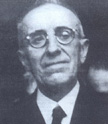 1925
1925Jerónimo González was born in Sama de Langreo, Asturias, in 1875. He studied Law in Oviedo, where he was taught by Leopoldo Alas, Clarín.
Keep reading -
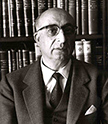 1965
1965Ramón María Roca-Sastre was born in Tàrrega in 1899, He graduated in Law in 1923. In 1924 he took over the position of Registrar of Belchite
Keep reading -
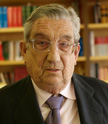 1979
1979He was born in Burgos in 1931. He studied Law in Madrid and was student of Federico de Castro. He obtained the extraordinary award for his undergraduate degree and the Fundación Montalbán award for the best academic record
Keep reading -
 2016
2016Aurelio Menéndez Menéndez Born in Gijón in 1927. He was a Doctor of Law and professor of Commercial Law at the Autonomous University of Madrid, having previously fulfilled this role at the universities of Santiago
Keep reading -
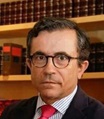 2018
2018Francisco Javier Gómez Gálligo Born in Madrid in 1960, he obtained a Doctorate in Law from the Complutense University of Madrid with the grade of outstanding cum laude.
Keep reading
Published every two months, it has a circulation of 2,500 copies that are distributed among its subscribers, inside and outside of Spain.
The Critical Review of Real Estate Law has established itself on both sides of the Atlantic as a reference publication in the scientific study of private law in its broadest sense. In the Magazine, works and articles of all the doctrinal arc are collected. For any researcher and scholar of legal reality, it is a source of prestige to appear in it, due to the high standards required by the Editorial Board. The specialists in private law attribute enormous technical value to it for its careful selection of articles, without ever forgetting the rigour and depth of an outstanding legal publication, the journal never loses contact with current affairs; An example is the monographic issue on housing policy, published in the September / October 2005 issue. The magazine has subscribers and permanent exchanges with nearly 40 universities.
Jerónimo González
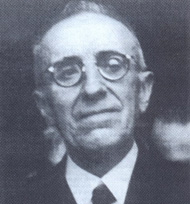
Jerónimo González was born in Sama de Langreo, Asturias, in 1875. He studied Law in Oviedo, where he was taught by Leopoldo Alas, Clarín. He obtained his Doctorate in Madrid. His legal thinking, influenced by his love for mathematics, of which he became a teacher, was also infused by an ethical concern for Krausism. In 1907 he obtained the highest score of his year in the public entrance examinations for Lawyers of the General Directorate of Registries and Notaries. He became Professor of Civil Law, Deputy Director General and President of the First Chamber of the Supreme Court. He was decisively involved in the elaboration of the 1909 Mortgage Law, and his legal studies on mortgage law still have an indelible place in the current syllabus of the public entrance examinations to Notaries and Registries and in legal doctrine.
The significance of the figure of Jerónimo González in the origin and history of the Critical Review of Real Estate Law is reflected in the article published in number 619 of the Magazine (monographic in Tribute to D. Jerónimo González Martínez), November-December 1993, written by the then secretary of the Magazine, Francisco Corral Dueñas, under the title "The Magazine of Mr Jerónimo González".
Ramón María Roca-Sastre
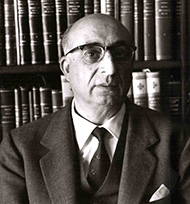
Ramón María Roca-Sastre was born in Tàrrega in 1899, He graduated in Law in 1923. In 1924 he took over the position of Registrar of Belchite, and before that he gave a series of conferences on Mortgage Law at the Law Faculty of Barcelona. In 1932 he took office as Notary Public in Villafranca del Penedés. In 1933, after the corresponding public entrance examination, he was appointed Judge of 1st Instance and Instruction of Montblanc (Tarragona). Subsequently, he took over the position of Senior Judge of the Court of Cassation of Catalonia on April 30, 1936. He was a member of the Legal Advisory Commission of the Government of Catalonia, and in June 1936 he was already Vice President of the Academy of Jurisprudence and Legislation of Barcelona of which he later, after the civil war, became President.
In 1956 he read his speech at the Royal Academy of Jurisprudence and Legislation on "The trust ‘si sine liberis decesserit’ and the Civil Code". In 1959, he was awarded the Grand Cross of the Order of Alfonso X the Wise. He was part of the Catalan Civil Law Compilation Commission. Honorary President of the II Catalan Legal Congress. In 1972, he was awarded Doctor Honoris Causa by the University of Barcelona.
Luis Díez-Picazo y Ponce de León
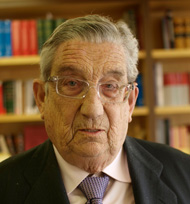
He was born in Burgos in 1931. He studied Law in Madrid and was student of Federico de Castro. He obtained the extraordinary award for his undergraduate degree and the Fundación Montalbán award for the best academic record. He later he earned his doctorate in Law, in 1956, with a thesis entitled "The arbitration of a third party in legal affairs", receiving the Extraordinary Doctorate Award and the Award of the Condesa de Maudes Foundation.
In 1956 he entered the judiciary by public entrance examination, serving for a few months as Judge of First Instance and Instruction. In 1963 he obtained by public entrance examination the position of Chair of Civil Law at the University of Santiago de Compostela. Subsequently he joined the University of Valencia (1964-1972) and, later (1972), the Autonomous University of Madrid. He combined the teaching and research of Law with the practical exercise of it as a lawyer Menéndez - as arbitrator and as Constitutional Judge.
He was Director of the Critical Review of Real Estate Law from 1979. He was named Doctor Honoris causa by universities inside and outside of Spain, as well as Honorary Professor of the Universities of Lima, Nacional Mayor de San Marcos and San Agustín de Arequipa (Peru). Founding member of the European Law Institute, and Full Member of the Peruvian Law Academy and Corresponding Member of the National Academy of Law and Social Sciences of Córdoba (Argentina).
He also actively participated in the legal reforms undertaken during the political transition. He held the position of Senior Judge of the Constitutional Court, being one of the members of the first term of this body (1980-89). He chaired the First Section of the General Codification Commission from 1978. He was a Member of the Royal Academy of Jurisprudence and Legislation, and its President between 2012 and 2015.
He held the Medal of the Order of Constitutional Merit (2000), and belonged to the Free Public Corporation of Emeritus (2001). He received posthumously the Grand Cross of the Civil Order of Alfonso X the Wise.
Aurelio Menéndez Menéndez
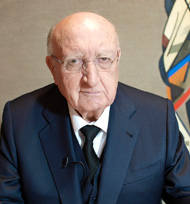
Born in Gijón in 1927. He was a Doctor of Law and professor of Commercial Law at the Autonomous University of Madrid, having previously fulfilled this role at the universities of Santiago, Salamanca and Oviedo. He was also Dean (and Dean of Honour) of the Faculty of Law of the Autonomous University of Madrid, where he was awarded the Gold Medal. He received an honorary doctorate from the Universities of Oviedo and Carlos III of Madrid.
He was Minister of Education and Science and Senior Judge of the Constitutional Court.
Founder, together with Rodrigo Uría González, of Uría Menéndez. He presided over various international arbitration tribunals.
Member of the editorial board of the "Commercial Law Magazine" and the "Spanish Insurance Magazine". Permanent member of the International Maritime Committee, member of the Free Public Corporation of Emeritus, President of the Commercial Law Section of the General Codification Commission, Elective State Councilor and Member of the Royal Academy of Jurisprudence and Legislation.
He received the Prince of Asturias Award for Social Sciences in 1994 and the 1999 Pelayo Award for Lawyers of Recognized Prestige.
Historically related to the Royal Household, he was the tutor of the king (then prince) Felipe VI, in 2011 he was granted the title of Marquis of Ibias. He was awarded the Great Crosses of Alfonso X El Sabio, Carlos III, Naval Merit and San Raimundo de Peñafort.
Francisco Javier Gómez Gálligo
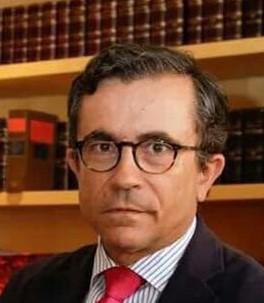
Born in Madrid in 1960, he obtained a Doctorate in Law from the Complutense University of Madrid with the grade of outstanding cum laude.
Property and mercantile registrar since 1984.
Lawyer assigned to the General Directorate of Registries and Notaries of the Ministry of Justice by virtue of public entrance examination between notaries and registrars, in 1998. Notary (on leave) from that same date.
He has been Associate Professor of Civil Law at the Universities Rovira Virgili (Tarragona), ESADE (Barcelona) and Rey Juan Carlos (Madrid), Villanueva University Center (attached to the Complutense University of Madrid) and Professor of Commercial Law at the Study Center University (CUNEF).
Permanent member of the General Codification Commission (Ministerial Order of March 31, 2000).
He was President of the Board of public entrance examinations to property and mercantile registers in six examinations (Madrid 2002, 2004 and 2005/2006 and Boards of Seville 2009, Madrid 2012-2013 and Madrid 2014) and was also secretary of the examinations of the year 2000.
Secretary Counselor of the Review of Real Estate Law, from January 2003 to 2018, the year in which he was appointed President of this Review.
He obtained advanced research accreditation, which qualifies him to become Professor of Civil Law, by the Catalan University Quality Agency (AQU) in October 2012.
Author of 7 books, 58 articles in legal journals, 44 studies in collective works.
He was awarded the Cruz de San Raimundo de Peñafort, 1st class in 1996 and 2nd class in 1992.
Likewise, he was awarded the Medal of Honour from the Public Corporation of Registrars, in November 2005.
He is a (corresponding) Academic of Jurisprudence and Legislation since 2014.
He has been Director General of Registries and Notaries of the Ministry of Justice from October 31, 2014 to August 3, 2018.
He has been awarded the Cross of Honor of San Raimundo de Peñafort. Ministerial Order of December 4, 2018.

